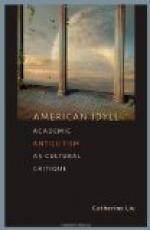From a second lieutenant in France: “I loved Carl. He was far more to me than just a friend—he was father, brother, and friend all in one. He influenced, as you know, everything I have done since I knew him—for it was his enthusiasm which has been the force which determined the direction of my work. And the bottom seemed to have fallen out of my whole scheme of things when the word just came to me.”
From one of the young officers at Camp Lewis: “When E—— told me about Carl’s illness last Wednesday, I resolved to go and see him the coming week-end. I carried out my resolution, only to find that I could see neither him nor you. [This was the day before Carl’s death.] It was a great disappointment to me, so I left some flowers and went away. . . . I simply could not leave Seattle without seeing Carl once more, so I made up my mind to go out to the undertaker’s. The friends I was with discouraged the idea, but it was too strong within me. There was a void within me which could only be filled by seeing my friend once more. I went out there and stood by his side for quite a while. I recalled the happy days spent with him on the campus. I thought of his kindliness, his loyalty, his devotion. Carl Parker shall always occupy a place in the recesses of my memory as a true example of nobility. It was hard for me to leave, but I felt much better.”
From one of his women students: “Always from the first day when I knew him he seemed to give me a joy of life and an inspiration to work which no other person or thing has ever given me. And it is a joy and an inspiration I shall always keep. I seldom come to a stumbling-block in my work that I don’t stop to wonder what Carl Parker would do were he solving that problem.”
Another letter I have chosen to quote from was written by a former student now in Paris:—
“We could not do without him. He meant too much to us. . . . I come now as a young friend to put myself by your side a moment and to try to share a great sorrow which is mine almost as much as it is yours. For I am sure that, after you, there were few indeed who loved Carl as much as I.
“Oh, I am remembering a hundred things!—the first day I found you both in the little house on Hearst Avenue—the dinners we used to have . . . the times I used to come on Sunday morning to find you both, and the youngsters—the day just before I graduated when mother and I had lunch at your house . . . and, finally, that day I left you, and you said, both of you, ‘Don’t come back without seeing some of the cities of Europe.’ I’d have missed some of the cities to have come back and found you both.
“Some of him we can’t keep. The quaint old gray twinkle—the quiet, half-impudent, wholly confident poise with which he defied all comers—that inexhaustible and incorrigible fund of humor—those we lose. No use to whine—we lose it; write it off, gulp, go on.




